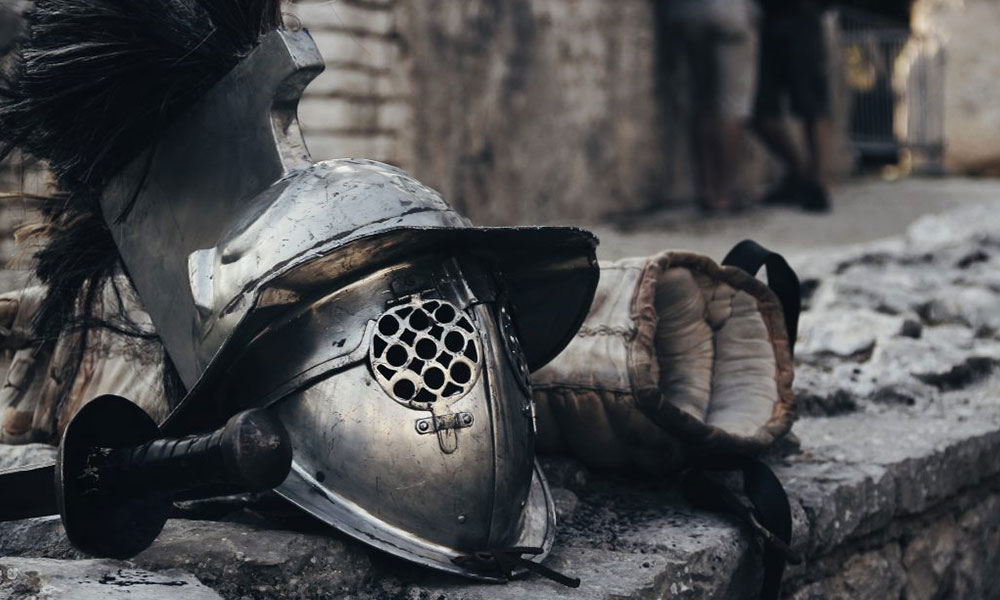(Our Spiritual Weapons and Armor - Part 1 | Part 2)
In the first section of this study, we began to look at the armor and weapons the Christian soldier's commander equips him with. So far we have established that we are engaged in a spiritual war, and we have looked at the belt of truth, the breastplate of righteousness, and the gospel of peace. In this part of the study, we will look at the rest of his equipment.
The Shield of Faith
The Scripture: Hebrews 11:1 in The Amplified Bible
"Faith is 'the assurance (the confirmation, the title-deed) of the things [we] do not see and the conviction of their reality - faith perceiving as real fact what is not revealed to the senses.'"
1. What is the next piece of equipment?
2. Paraphrase Paul's definition in your own words.
Another definition could be: "The absolute conviction that God keeps His promises.”
The Scripture: Hebrews 11:6
"Without faith it is impossible to please God, because anyone who comes to Him must believe that He exists and that He rewards those who earnestly seek Him."
3. What must we have to please God?
4. What must we believe?
The Scripture: Romans 1:17
"In the gospel righteousness from God is revealed, a righteousness that is by faith from first to last, just as it is written: 'The righteous will live by faith.'"
5. How will the righteous live?
The Scripture: Ephesians 6:16
"Take up the shield of faith, with which you can extinguish all the flaming arrows of the evil one."
6. What are we able to do with the shield of faith?
The darts used in ancient warfare were hollow reeds filled with combustible material. These were set on fire and then shot from bows. They were excellent weapons against the walled cities of the time. If the attacking army could not penetrate the walls, they could shoot flaming darts over the walls, to strike the highly combustible thatched roofs of the houses within the walls. Using water against this type of fire only spread it. The large shields used by soldiers protected them personally from these "flaming missiles."
Shields made of several thicknesses of bullhide were stretched over a frame of wood and sometimes strengthened and decorated with metal trims and pieces of metal.
The Scripture: Isaiah 21:5
"Get up, you officers, oil the shields!"
7. How did the officers care for their shields?
Rubbing the shields with oil prevented the leather from drying out and cracking, and the metal from rusting. In times of battle, the oiling was especially necessary and so "anointing" the shield was equivalent to preparing for war.
Oil is a symbol of the Holy Spirit. As spiritual warriors we need to live in accordance with the Spirit and have our minds set on what He desires.
The Helmet of Salvation
The Scripture: Ephesians 6:17
"Take the helmet of salvation and the sword of the Spirit, which is the word of God."
8. What is the next piece of armor?
Salvation means the action or results of deliverance or preservation from danger or disease. It implies safety, health and prosperity.
The Scripture: Acts 4:12
"Salvation is found in no one else, for there is no other name under heaven given to men by which we must be saved."
9. What is the only name by which we may be saved?
The Scripture: Romans 1:16
"I am not ashamed of the gospel, because it is the power of God for the salvation of everyone who believes: first for the Jew, then for the Gentile."
10. What is the gospel?
The helmet covers the head. The head speaks of authority, while a covered head speaks of submission.
The Sword of the Spirit
11. Verse 17 also speaks of another piece of equipment. What is it?
12. What is the sword of the Spirit?
The Scripture: Hebrews 4:12 in the Amplified Bible
[The word of God] "is alive and full of power - making it active, operative, energizing and effective; it is sharper than any two-edged sword, penetrating to the dividing line of the breath of life (soul) and [the immortal] spirit, and of joints and marrow [that is, of the deepest parts of our nature] exposing and sifting and analyzing and judging the very thoughts and purposes of the heart."
13. How does Paul describe the word of God?
14. What does this do?
15. What is it sharper than?
16. What does it divide?
17. What does that do?
The Scripture: John 1:1, 14
"In the beginning was the Word, and the Word was with God, and the Word was God....The Word became flesh and made His dwelling with us. We have seen His glory, the glory of the One and Only, who came from the Father, full of grace and truth.”
18. How long has the Word (Jesus) existed?
19. Who is the Word?
20. What did He do?
The Scripture: Colossians 1:15-23
"He (Jesus) is the image of the invisible God, the firstborn over all creation. For by Him all things were created; things in heaven and on earth, visible and invisible, whether thrones or powers or rulers or authorities; all things were created by Him and for Him. He is before all things, and in Him all things hold together. And He is the head of the body, the church; He is the beginning and the firstborn from among the dead, so that in everything he might have supremacy. For God was pleased to have all His fullness dwell in Him, and through Him to reconcile to Himself all things, whether on earth or things in heaven by making peace through His blood, shed on the cross."
21. What new things does Colossians tell us about Jesus?
These scriptures describe the Word of God, Jesus, the creator of the world.
The Scripture: Ephesians 6:18
"I will pray with my spirit, but I will also pray with my mind; I will sing with my spirit, but I will also sing with my mind."
22. Name the different ways Paul says he prays.
Praise is another important form of prayer and is mentioned in the Bible over 500 times, more than any other subject.
The Scripture: Psalm 22:3
"Yet, You are holy, enthroned on the praises of Israel."
23. What does this verse tell us our praises do?
The one chapter in the Bible that shows us the power of spiritual warfare is 2 Chronicles 20:1-29. Listen carefully as your instructor reads it to you.
24. List the different forms of spiritual warfare that were used by King Jehoshaphat against his enemies.
25. Who actually won the victory?
Many of us engage in spiritual warfare only when we are in trouble and stop when the skirmish is won. However, the Bible indicates a much more aggressive form of warfare, for which the gates of hell are no match.
The exploits of God's mighty warriors have the power to strike terror into the hearts of Satan's troops. We should never be satisfied with small victories - we should keep up the warfare until the enemy turns tail and runs, leaving behind the spoils of lives set free, whole area coming out from under the dominion of Satan.
The Answers
- The shield of faith
- Your paraphrase
- Faith
- That God exists and that He rewards those who earnestly seek Him
- By faith
- Extinguish all the flaming arrows of the evil one
- With oil
- The helmet of salvation
- Jesus
- The power of God for the salvation of everyone who believes
- The sword of the Spirit
- The word of God
- As alive and full of power
- Makes it active, operative, energizing and effective
- A two-edged sword
- The soul and the spirit
- It exposes, sifts, analyzes and judges the thoughts and purposes of the heart.
- Since the beginning
- Jesus – God
- He became flesh and made His dwelling with us.
- All things were made by Him and for Him. He is before all things and all things hold through Him, reconciles everything to Himself.
- With his spirit and with his mind; he sings with his spirit and with his mind.
- Enthrone God
- Inquiring of the Lord, fasting, prophecy, encouragement, worship, praise, singing
- The Lord
All scripture quotations in this publication are from the Holy Bible, New International Version
(unless otherwise indicated)
Copyright © 1973, 1978, 1984, New International Bible Society
Copyright © 2004 by JoAnne Sekowsky





